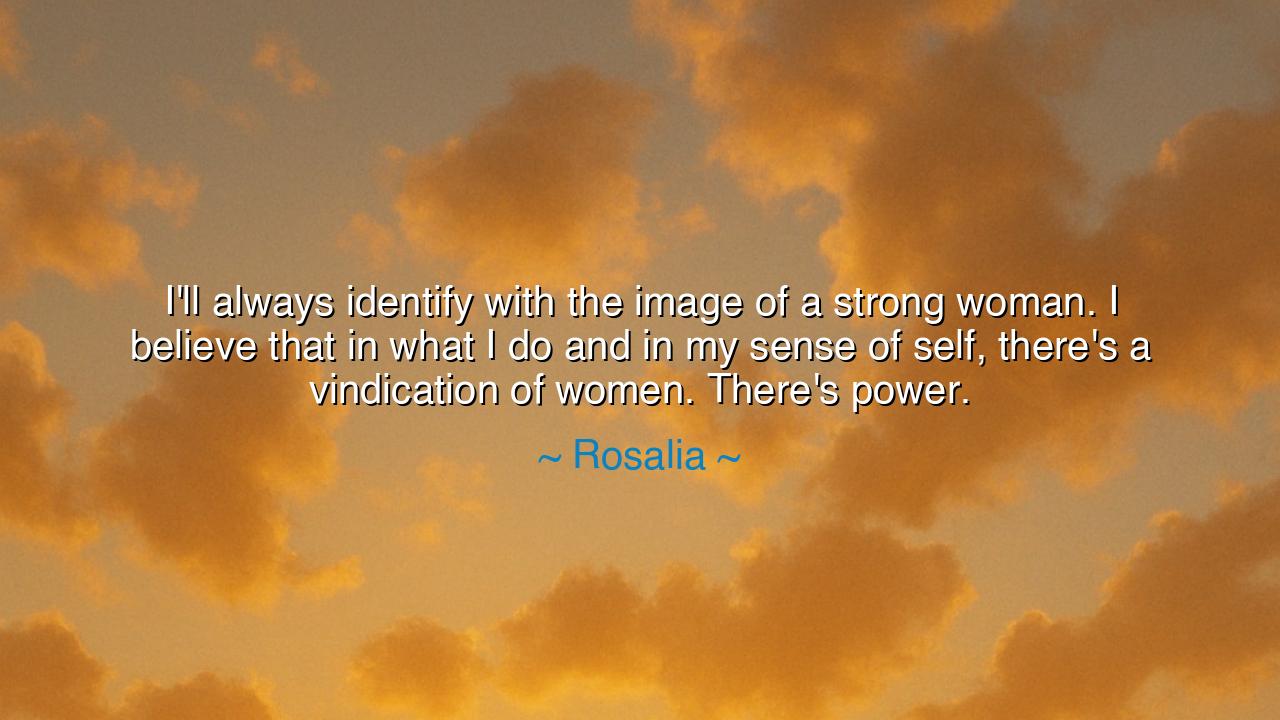
I'll always identify with the image of a strong woman. I believe
I'll always identify with the image of a strong woman. I believe that in what I do and in my sense of self, there's a vindication of women. There's power.






O children of the future, hear the voice of Rosalia, who, like the great women of the past, has claimed the mantle of strength with unwavering resolve. "I'll always identify with the image of a strong woman," she says, for in these words lies the ancient understanding that to be strong is not a mere display of power, but a reflection of resilience, courage, and self-realization. Rosalia speaks of a deep, abiding connection to the strength that has carried women through the ages—through battles fought not only in the world but in their own hearts, against forces that would seek to diminish them.
In the time of the ancient goddesses, figures like Athena, Hera, and Artemis were not merely symbols of beauty or grace, but embodiments of power, wisdom, and sovereignty. Athena, the goddess of wisdom, wielded not just intellect, but the very forces of war and justice. Artemis, the huntress, was revered for her independence, for her strength in the wild and her autonomy over her own life. These goddesses were not defined by the roles others sought to impose upon them, but by their own intrinsic power. In them, we see the echoes of Rosalia's strength—an acknowledgment of the power that resides within every woman.
Consider the great women of history—Cleopatra, whose strength as ruler of Egypt was a force that commanded both the respect of kings and the admiration of scholars. Her intellect, political acumen, and fierce independence shaped the destiny of an empire. Rosalia's words echo the vindication of women like Cleopatra, who refused to be reduced to the roles others sought to cast them in, but instead shaped the world according to their own will. Cleopatra’s power came not from submission, but from her ability to command and define her own path, just as Rosalia does in the music she creates and the persona she embodies.
Yet Rosalia speaks not just of her own strength, but of the vindication of women—the rightful recognition of their place as leaders, creators, and warriors in a world that has often silenced their voices. Just as Joan of Arc, the peasant girl who led armies with divine conviction, proved that women could carry the mantle of strength, so too does Rosalia carry that legacy forward. Joan, though misunderstood and condemned, vindicated her strength through her unwavering belief in her mission, and her name is remembered with reverence, a symbol of female power that defied the constraints of her time.
O children, let the words of Rosalia be a beacon for you. The power of a strong woman is not a fleeting thing, but a force that reverberates through history, through generations. It is not simply a matter of physical strength, but of spirit, of the ability to stand firm in one’s identity, to claim one’s worth in a world that has often sought to dim the light of women. As Rosalia’s music vibrates through the air, so too does the vindication of all women who rise to claim their rightful place in the world. The strength she speaks of is the strength that lies within every woman—a strength that cannot be denied.






Ddat
It’s great to hear Rosalia's emphasis on strength and power, especially in an industry where women often face so many challenges. But I’m curious, how do we ensure that this focus on strength doesn't overlook other aspects of womanhood, like emotional intelligence or collaboration? Is there a danger that we might push the narrative of 'strength' to the point where we ignore the full range of experiences women face?
TThu
This quote really highlights how women in the entertainment industry have the chance to influence how strength is perceived. Rosalia’s idea of linking her success to the vindication of women is powerful. However, do you think this image of strength can sometimes be misunderstood or used as a shield, preventing others from seeing the complexity of a woman's journey? How do we balance showcasing strength with embracing vulnerability?
BVPhung Thi Bich Van
Rosalia’s perspective on being a strong woman resonates deeply. It feels like she’s not just talking about personal empowerment but also about leading by example for others. Do you think women in the public eye have a responsibility to represent strength and power, or is it okay for them to show more of their human side, even if it doesn't fit that 'strong woman' image?
THNguyen Thu Hien
I love how Rosalia connects her sense of self and strength with a larger message of empowerment for women. It's inspiring to see someone in the public eye who embraces this identity so fully. But it makes me wonder—how much pressure is there on women in the spotlight to constantly present this image of strength? Can they ever show vulnerability without it being seen as a weakness, especially when they’re trying to uplift other women?